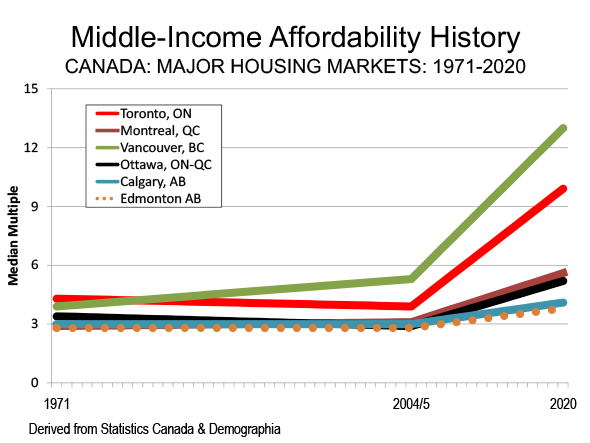In Canada, where income adjusted house prices vary more than five times between metropolitan areas, the threat of a federal initiative to tax house equity could be looming. That’s the conclusion columnist Lorne Gunter, writing in The Edmonton Sun, The Winnipeg Sun and other Sun Media outlets. The headline read: “Liberals laying groundwork to tax homeowners’ equity: Officials are softening up the ground for such a tax by insisting it is unfair that today’s homeowners have so much value in their homes while so many others cannot afford homes.
According to Gunter the evidence is in a report by the federal government’s Canada Mortgage and Housing Corporation, parts of which have been obtained by Blacklock’s Reporter (described as an “Ottawa insider newsletter”, which is the equivalent of a “Washington insider newsletter” in the United States). The report, “Wealth and Generational Equity in Canadian Housing,” according to Gunter, will be released at some point after the September 20 national election.
According to Gunter: “The current draft of the report recommends the Liberals “examine tax and other public finance policy opportunities to level the intergenerational playing field.” The Liberals currently form the federal government, under Prime Minister Justin Trudeau, but are in a tight election race with the opposition Conservatives and New Democrats.
House prices, adjusted for incomes, are far higher in the Vancouver and Toronto metropolitan areas than in much of the rest of the nation. According to the Demographia International Housing Affordability (2021), published by the Frontier Centre for Public Policy, the median multiple (median house price divided by the median household income) is 13.0 in Vancouver, 9.9 in Toronto. By contrast, Demographia reports that median housing prices were 6.1 years less of median household income in Edmonton (median multiple of 3.8). Today, there remain a number of metropolitan areas with median multiples even lower than Edmonton’s.
Just 15 years ago, Toronto housing prices were only 1.6 years of income more costly, with Toronto’s median multiple being 4.4 and Edmonton’s 2.8. This was just after the Ontario government had implemented its greenbelt policy, which like elsewhere around the world, has been associated with huge increases in house prices relative to incomes. The problem with such policies (referred to as urban containment or compact city policies) is that they ban or severely limit development on the urban periphery, where land is affordable. This creates a scarcity of housing drives up house prices throughout the housing market (metropolitan area), while extinguishing opportunity for young households and others of more limited means (including many immigrants).
Vancouver’s similar policy was adopted decades ago, when there was only modest difference between its housing affordability and that of the rest of the nation (see Figure below).
Canada could face a very contentious debate on housing policy.
Wendell Cox is principal of Demographia, an international public policy firm located in the St. Louis metropolitan area. He is a founding senior fellow at the Urban Reform Institute, Houston, a Senior Fellow with the Frontier Centre for Public Policy in Winnipeg and a member of the Advisory Board of the Center for Demographics and Policy at Chapman University in Orange, California. He has served as a visiting professor at the Conservatoire National des Arts et Metiers in Paris. His principal interests are economics, poverty alleviation, demographics, urban policy and transport. He is co-author of the annual Demographia International Housing Affordability Survey and author of Demographia World Urban Areas.
Mayor Tom Bradley appointed him to three terms on the Los Angeles County Transportation Commission (1977-1985) and Speaker of the House Newt Gingrich appointed him to the Amtrak Reform Council, to complete the unexpired term of New Jersey Governor Christine Todd Whitman (1999-2002). He is author of War on the Dream: How Anti-Sprawl Policy Threatens the Quality of Life and Toward More Prosperous Cities: A Framing Essay on Urban Areas, Transport, Planning and the Dimensions of Sustainability.













